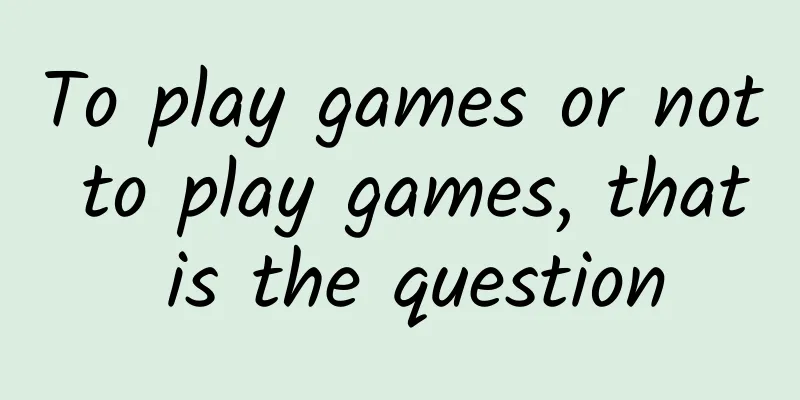To play games or not to play games, that is the question

|
Author: Li Huijie (Institute of Psychology, Chinese Academy of Sciences) The article comes from the Science Academy official account (ID: kexuedayuan) —— At the Jakarta Asian Games, the Chinese team won 132 gold medals, 92 silver medals, and 65 bronze medals, continuing to lead Asia! In addition to regular events, Chinese e-sports also won 2 gold medals and 1 silver medal in this Asian Games. The Chinese team defeated the South Korean team with a score of 3-1 and won the Asian Games League of Legends championship (Photo source: Internet) (Parents and teachers’ inner thoughts:) Can you win a gold medal by playing games?! Aren’t games a scourge? In fact, the relationship between “games” and human behavior is not simple! Games can sometimes heal Apart from the leisure and entertainment functions of games, in the eyes of scientists, games can also be a good remedy. Helping stroke patients regain limb movement After a stroke, up to 80-90% of patients will have difficulty moving their hands and arms. Researcher Alma Merians and others have tried using computer games and robot training to help patients. They used Nintendo action games Plasma Pong and Hammer Task to improve hand and arm coordination, accuracy and speed, and Virtual Piano and Hummingbird Hunt to help restore grip strength and precision in finger movements. After eight days of training, two to three hours a day, all patients showed improved control of reaching, stability of the affected upper limb, and improved fluidity and efficiency of movement. Movement analysis showed that patients had improved control of their fingers and were faster in all test tasks. Patients improved an average of 20-22% in standard clinical score assessments. Game screenshots (Image source: Internet) The above studies show that sports video games can keep patients highly motivated during rehabilitation training, are reasonably priced, and doctors can remotely monitor and guide patients' rehabilitation training. Therefore, sports game training has certain application value in the clinical rehabilitation of stroke patients. Improve children's reading ability When you are chatting with a friend, and someone suddenly calls your name from behind, your attention will shift from the person you are talking to (visual) to the voice behind you (auditory). This is a simple example of attention shifting across sensory channels. Researchers have found that compared with children with good reading skills, children with reading difficulties encounter more problems in the integration of multi-sensory channels from vision to hearing. To address this issue, researchers Franceschini and others used video games to improve audio-visual integration and processing capabilities. Game screenshot (Image source: Kelly et al., 2016, JAMA Ophthalmology) They selected action video games ("Bunny Hunt" and "Twist Your Butt" from Nintendo games: the former is a shooting game where players need to shoot bunnies that may appear anywhere on the screen while avoiding being shot by bunnies; the latter is a dancing game where players' hands need to dance according to the rhythm of the bunnies jumping from left to right) and motor practice games, and conducted 9 training sessions of 80 minutes each for 20 children aged 7-13 with dyslexia symptoms, which were completed within two weeks. The results showed that action video games effectively improved children's attention and also improved their reading speed. Changes in general reading ability of children with reading difficulties after game training. Figure A shows the improvement in reading ability; Figure B shows the ratio of reading speed to accuracy. The larger the value, the lower the efficiency. (Image source: Franceschini et al., 2013) Do games necessarily lead to aggressive behavior? Many people have a negative attitude towards video games, believing that games can make people irritable and anxious. In many news reports, we can see family "fights" caused by games, but scientists still have different opinions on whether there is a direct relationship between aggressive behavior and violent games. Some say: violent games lead to increased aggressive behavior In 2013, Hasan et al. found that the time spent playing violent video games was positively correlated with aggressive behavior. The research team selected 70 French college students, divided them into a violent video game group and a non-violent video game group, and asked them to play games for 20 minutes every day for three consecutive days. The violent game group randomly played action-adventure games (Condemned 2), shooting games (Call of Duty 4), or survival games (The Club), while the non-violent game group randomly played racing games (S3K Superbike, Dirt2, and Pure). After each game session, the researchers tested the students' hostility expectations. Shooter game players (Image source: Michaela Jarvis, 2017, Science) The results showed that the violent game group's hostile expectations and aggressive behaviors increased day by day. In contrast, the non-violent game group's hostile expectations and aggressive behaviors did not change during the three-day experiment. In 2016, Mikhail Zvyaginstev and others studied the brain activity characteristics of 19 college students when playing games. All college students participating in the experiment had to play a racing game called "Carmaggedon" and undergo magnetic resonance imaging of their brains. In this game, players drive a virtual racing car with the goal of getting more points. Half of the college students played the violence-related version and scored points by running over pedestrians; the other half played the non-violence-related version and scored points by collecting prizes while driving. The left picture shows the violent game condition, where points are gained by running over pedestrians; the right picture shows the non-violent condition, where points are gained by collecting prizes that appear on the road. (Image source: Mikhail Zvyaginstev et al., 2016, Neuroscience) The results showed that compared with those who played the non-violent version, those who played the violent version showed decreased functional connectivity in six brain networks: three primary sensory processing networks such as auditory, visual and motor networks, and three higher-level processing networks including the reward network (important for learning, decision-making and addiction), the default network (a network active during resting or daydreaming states), and the right frontoparietal network (a network responsible for attention and attention switching). Why do violent games lead to increased aggressive behavior? Scientists have not reached a unified view on this issue. The first view is that players practice aggressive thinking in violent games, which increases their aggressive behavior in real life. Players who frequently play violent games will be highly alert to hostility when faced with conflicts, and will also have aggressive thinking and will use aggressive behavior to resolve conflicts. This behavior will be reinforced in the game by gaining points or increasing levels. Players reinforce aggressive thinking in the game, and in turn, habituating to aggressive thinking will cause them to take more aggressive behavior in real life. The second view is that the player's experience of failure and frustration in the game leads to an increase in aggressive behavior. Przybylski and colleagues at the University of Oxford explored the psychological experience of players when playing games. They recruited nearly 600 college students to complete 6 laboratory experiments, manipulating the game's interactive interface, joysticks, and difficulty to examine the players' aggressive thoughts, feelings, and behaviors when playing games (violent and non-violent games). In this series of experiments, the researchers found that if players cannot master and control the game and reach higher levels, they will feel frustrated and exhibit aggressive behavior. This result has nothing to do with the type of game, and violent or non-violent games will lead to similar results. I believe that many people will have similar experiences. When work is not progressing or when you lose a game, you often produce aggressive words or behaviors. Game screenshots (Image source: Internet) Some say: Games don’t necessarily lead to an increase in violent behavior The real world is always more complicated than games, and there are many factors that influence behavior in games. In 2014, Christopher Ferguson found that violent content in movies and games was not related to violence in society. Ferguson first examined the relationship between violent content in movies and homicide rates from 1920 to 2005. Overall, there was no relationship between movie violence and homicide rates. He then analyzed the relationship between violent content in video games and rates of violent behavior among adolescents from 1996 to 2011. The results showed that violent video game consumption was significantly correlated with a decrease in the rate of violent behavior among adolescents. However, the researchers believe that this correlation may be accidental and does not indicate that video games are responsible for the decrease in violent behavior among adolescents. Gregor Szycik and others from Hannover Medical School in Germany also explored the effects of long-term playing violent games on the brain. They recruited male players of shooting games such as Call of Duty and Counter-Strike, who played for at least two hours a day in the past four years. The researchers found that there was no difference in aggression and empathy scores between gamers and a control group that did not play games. In addition, the two groups showed similar brain activation characteristics when viewing pictures that induced emotional responses. Some researchers believe that linking violent games with adverse consequences such as aggressive behavior is a bit too simplistic. Most current studies are laboratory experiments, which do not match the real world. David Ewoldsen and others from Ohio State University found that compared with college students who played competitive violent games, if college students cooperated in violent games, they would show more cooperative behavior and less aggressive behavior. Choosing which games to play is important Do games only have negative effects? Answer: No. In 2012, Whitaker and Bushman explored the relationship between games and prosocial behavior. They first asked a group of college students to evaluate the games, and then divided the games into three categories: prosocial, neutral, and violent. In the first experiment, they randomly divided 150 college students into three groups and asked them to play a prosocial (Endless Ocean), neutral (Super Mario), or violent game (Resident Evil 4) for 20 minutes. Game screenshots (Image source: Internet) Afterwards, the college students were asked to participate in a task and told that there was an invisible competitor (in fact, there was no competitor). Those who responded quickly in the task would receive a monetary reward, and the loser would be punished by noise through headphones. When the competitor won, the reward was determined by the college students, and when the competitor lost, the intensity and length of the noise punishment were also determined by the college students. The results showed that compared with college students who played neutral and prosocial games, college students who played violent games showed higher aggression and made their opponents accept higher and longer noises when their competitors lost. College students who played neutral games also showed more aggression than college students who played prosocial games. On the other hand, after their competitors won, college students in the prosocial game group gave their opponents more money than those in the violent game group. The researchers believe that these findings show that prosocial games make people kinder and reduce aggressive behavior. Prosocial behavior experiment 1 (Image source: provided by the author) They then found another 116 college students for a second experiment. The study also divided college students into three groups: prosocial games, neutral games, and violent games. Each group played the game for 20 minutes. After the game, they were told that another study needed a lot of pencils and asked if they were willing to help sharpen pencils. The researchers evaluated prosocial behavior by the number of pencil sharpenings, because helping others sharpen pencils is a boring task that takes a lot of time. The results showed that the number of pencil sharpenings by members of the prosocial game group was significantly higher than that of the violent game group. Why do members of the prosocial game group show more prosocial behavior? The researchers believe that college students who play prosocial games experience more positive emotions such as happiness, love, and fun than members of the violent game group, and therefore are more inclined to help others. Prosocial behavior experiment 2 (Image source: provided by the author) Such research conclusions also apply to children and adolescents. Psychologists Harrington and O'Connell from University College Dublin surveyed 538 adolescents aged 9-15 on empathy, prosocial behavior (rated by teachers), video game habits, and socioeconomic status. The study found that the more prosocial games children and adolescents played, the higher their scores in emotional relationships, cooperation and sharing, and empathy. After excluding gender, age, school type, social situation, weekly game time, and the use of violent video games, the results remained unchanged. This study shows that for children and adolescents, the use of prosocial games helps children and adolescents develop empathy and helps improve their emotional relationships. Conclusion In fact, games are not a terrible thing. Moderate games can be used as a means of entertainment and relaxation in daily life, and can even be beneficial to the body and mind. Image of the fruit-cutting memory game developed by the Institute of Psychology to train the elderly (Source: provided by the author) I'd like to end this article with a famous quote from the start screen of many games: "Moderate gaming is good for the brain, but excessive gaming is harmful to the body. Arrange your time wisely and enjoy a healthy life." References: Merians, AS, Fluet, GG, Qiu, Q., Saleh, S., Lafond, I., Davidow, A., & Adamovich, SV (2011). Robotically facilitated virtual rehabilitation of arm transport integrated with finger movement in persons with hemiparesis. Journal of Neuroengineering and Rehabilitation, 8, 27. Franceschini, S., Gori, S., Ruffino, M., Viola, S., Molteni, M., & Facoetti, A. (2013). Action Video Games Make Dyslexic Children Read Better. Current Biology, 23(6), 462-466. Hasan, Y., Begue, L., Scharkow, M., & Bushman, BJ (2013). The more you play, the more aggressive you become: A long-term experimental study of cumulative violent video game effects on hostile expectations and aggressive behavior. Journal of Experimental Social Psychology, 49(2), 224-227. Zvyagintsev, M., Klasen, M., Weber, R., Sarkheil, P., Esposito, F., Mathiak, KA, . . . Mathiak, K. (2016). Violence-Related Content in Video Game May Lead to Functional Connectivity Changes in Brain Networks as Revealed by FMRI-ICA in Young Men. Neuroscience, 320, 247-258. Przybylski, AK, Deci, EL, Rigby, CS, & Ryan, RM (2014). Competence-impeding electronic games and players' aggressive feelings, thoughts, and behaviors. Journal of Personality and Social Psychology, 106(3), 441-457. Ferguson, CJ (2015). Does Movie or Video Game Violence Predict Societal Violence? It Depends on What You Look at and When. Journal of Communication, 65(1), 193-212. Gregor R. Szycik, Bahram Mohammadi, Thomas F. Münte, and Bert T. Te Wildt. (2017). Lack of Evidence That Neural Empathic Responses Are Blunted in Excessive Users of Violent Video Games: An fMRI Study. Frontiers in Psychology, 8, 174. Ewoldsen, DR, Eno, CA, Okdie, BM, Velez, JA, Guadagno, RE, & DeCoster, J. (2012). Effect of Playing Violent Video Games Cooperatively or Competitively on Subsequent Cooperative Behavior. Cyberpsychology Behavior and Social Networking, 15(5), 277-280. Whitaker, JL, & Bushman, BJ (2012). "Remain Calm. Be Kind.'' Effects of Relaxing Video Games on Aggressive and Prosocial Behavior. Social Psychological and Personality Science, 3(1), 88-92. Harrington, B., & O'Connell, M. (2016). Video games as virtual teachers: Prosocial video game use by children and adolescents from different socioeconomic groups is associated with increased empathy and prosocial behavior. Computers in Human Behavior, 63, 650-658. |
Recommend
What are the benefits of hot water foot bath? The best time and temperature for foot bath and health preservation
Soaking your feet in hot water can relieve fatigu...
When is the dangerous period?
The danger period mainly refers to the situation ...
I can't detect pregnancy and my period is not coming
What is the reason why I can’t detect pregnancy a...
Light yellow discharge
The main secretion in women's body is leucorr...
Lychees have such a high sugar content, why do people still suffer from low blood sugar after eating them?
Produced by: Science Popularization China Author:...
What are the low-sugar fruits suitable for pregnant women? Is it good for diabetics to eat low-sugar fruits?
As the name suggests, low-sugar fruits are fruits...
Why is my menstruation delayed and my lower abdomen bloated?
Women must pay attention to their diet during men...
What are the symptoms of menopausal syndrome in women?
Women are very likely to suffer from menopausal s...
What should I pay attention to when I have breast pain during menstruation?
During menstruation, many women will experience v...
What is the cause of sagging breasts during lactation and what should I do?
Every mother has to go through the breastfeeding ...
What should I do if there is still bleeding more than a month after delivery?
Mothers who have just given birth will often have...
Is it okay for pregnant women to wear silver bracelets?
Silver is a metal substance extracted from a natu...
What is the reason for frequent urination in women
Frequent urination not only affects the normal da...
This "nut" can detoxify the liver for 40 days after eating one? You may have it at home...
Expert of this article: Zhang Zhaomin, Master of ...
How long can I get an IUD during my menstrual period?
Women should not have an IUD inserted during thei...





![[Medical Q&A] What should a pregnant mother do if she gets shingles?](/upload/images/67f0e3688a348.webp)



